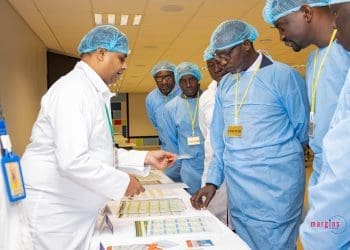Ghana’s agriculture GDP grows steadily, reflecting the sector’s resilience and improved productivity.
Ghana’s economy recorded a 5.3% expansion in the first quarter of 2025, outpacing the 4.9% growth registered during the same period in 2024.
The latest figures, released by the Ghana Statistical Service, indicate that the country’s economic recovery is gaining ground, largely fuelled by robust performance in the services and agriculture sectors.
Government Statistician, Dr Alhassan Iddrisu, told journalists at a media briefing in Accra that the agriculture sector posted a remarkable 6.6 per cent growth, up sharply from 2.4% a year ago.
Within the agriculture sector, fishing led the charge with a 16.4 per cent growth rate — a sign of potential revival in coastal and inland livelihoods.
Services, which remain the dominant contributor to GDP with a 46.8 per cent share, grew by 5.9%.
Information and Communication Technology (ICT) emerged as the sector’s top performer, expanding by 13.1%.
Trade, transport, banking, and health services also posted steady gains.
Industry lags behind as oil output drops
Despite the strong overall GDP performance, the industrial sector slowed down to 3.4 % growth in the first quarter of 2025, compared to 6.7% in the first quarter of 2024.
This decline was primarily due to a steep 22.1% contraction in the oil and gas sector.
“The drag from oil and gas is significant,” Dr Iddrisu explained, “but when we strip that out, the rest of the economy actually grew by 6.8%.”
This, he said, signals a growing diversification in the economy, with local manufacturing holding firm at a 6.6% growth rate — a sign that domestic production remains resilient.
Quarter-on-quarter improvement indicates momentum
The seasonally adjusted real GDP rose by 1.4 % in the first quarter of 2025 compared to 0.9% in the first quarter of 2024.
This 0.5 percentage point increase suggests that Ghana’s economic momentum is not only holding but picking up speed.
The main contributors to this growth were Crops, ICT, Manufacturing, Trade, Transport and Storage, and Finance and Insurance.
Together, these sectors accounted for 84.5% of the overall GDP growth.
Implications for households and businesses
For Ghanaian households, the rebound in agriculture — especially in crops and fishing — could mean improved food availability and potentially lower food inflation.
Dr Iddrisu noted that the government’s Agriculture for Transformation Programme, which includes input subsidies and farmer training, is beginning to show tangible results.
He also pointed out that with the services sector expanding, especially in ICT and transport, households could benefit from employment opportunities emerging under the government’s 24-Hour Economy initiative.
Night-shift jobs in logistics, customer support, retail, and healthcare could open up for youth and job seekers.
Strategic adjustments for businesses
Businesses, particularly in logistics, delivery services, and manufacturing, are being urged to realign operations to take advantage of the emerging 24-hour economic environment. With transport and ICT infrastructure expanding, there is scope to run multiple shifts, scale production, and serve broader markets.
Small and medium enterprises (SMEs), in particular, are encouraged to leverage ongoing infrastructure investments — including roads, irrigation systems, and storage facilities — to tap into local supply chains and regional export opportunities under the African Continental Free Trade Area (AfCFTA).
Policy recommendations and outlook
Dr Iddrisu called on the government to address the declining output in the oil and gas sector by intensifying activities of the Gold Board to stabilise earnings from extractive industries.
He also advised that accelerating the Big Push Programme — which prioritises investments in power, roads, and digital infrastructure — could stimulate private sector expansion and regional competitiveness.
He concluded that while Ghana’s economy is showing promising signs of diversification and resilience, sustained investment and policy discipline are essential to maintaining momentum and achieving inclusive growth.














